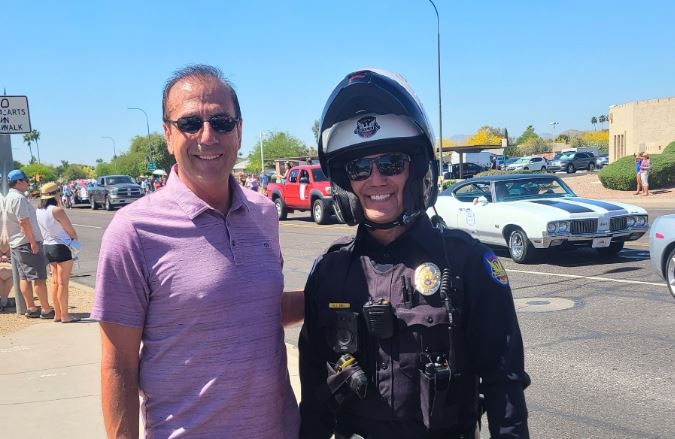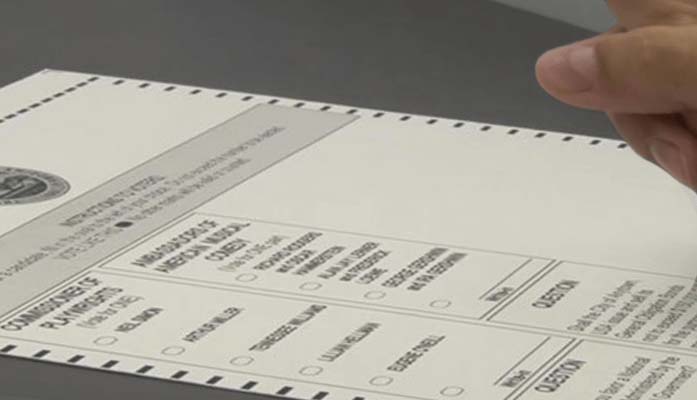
by Corinne Murdock | Nov 30, 2022 | News
By Corinne Murdock |
Phoenix City Councilman Sal DiCiccio has been posting daily updates on police reporting since September. It’s part of the outgoing councilman’s efforts to apprise citizens of their local law enforcement’s work on a daily basis.
These daily police reports offer details on crimes happening in the community. DiCiccio’s posts offer a small glimpse into their daily work — he doesn’t include the entire report.
DiCiccio’s latest report detailed an aggravated assault on an officer, two robberies, arson, several assaults, a school shooting threat, several misconduct weapons incidents, and several accident investigations.
DiCiccio has also informed constituents of the monthly district crime reports.
Last year, DiCiccio would share these reports as well as updates on police staffing to advise citizens of the rising crime rates combined with staffing shortages.
DiCiccio also informs the community about breaking crime issues, such as a homicide that occurred Monday.
In addition to crime and police-related content, DiCiccio posts about community events like park openings and lifeguard certification classes, dog adoptions, and school board updates.
DiCiccio posts constituent-focused content far more frequently than his fellow council members. The others tend to rely on their monthly district newsletter to inform constituents, with the exception of Councilwoman Yassamin Ansari, who posts more frequently at the rate of several times per week about community events pertaining to her office.
As of this report, Mayor Laura Pastor informed constituents last week about a toy and clothing drive last week, Councilman Jim Waring last tweeted thanks to his voters for reelecting him two weeks ago, Councilwoman Betty Guardado advised constituents to read her district newsletter two weeks ago, Councilwoman Ann O’Brien last retweeted a fire escape plan notice in mid-October, Councilwoman Debra Stark last retweeted in April about her appearance at the Phoenix Fire Department, and Councilman Carlos Garcia last tweeted last November about Phoenix Sky Harbor International Airport hiring.
Several council members are more active on Facebook. Their posts mainly reflect community events rather than major updates.
O’Brien encouraged constituents to vote, wished constituents a happy Thanksgiving, and updated constituents on the council’s approval of Metrocenter Mall’s redevelopment.
Waring last posted in October to encourage constituents to vote.
Stark shared her appearances with different groups, recent toy drive involvement, and a call to action for upcoming Habitat For Humanity home repair projects.
Pastor posted about several events: the toy and clothing drive, and an Alzheimer’s benefit.
Guardado posted videos of her attendance at a festival, and involvement in a tree donation event at a park.
Garcia posted an update about their quarterly Laveen Community meeting last week.
Corinne Murdock is a reporter for AZ Free News. Follow her latest on Twitter, or email tips to corinne@azfreenews.com.

by Corinne Murdock | Nov 30, 2022 | News
By Corinne Murdock |
Freshman lawmaker Alex Kolodin has eight election integrity bills ready to introduce in the upcoming legislative session.
Kolodin publicized these draft bills this week for constituent review.
Several of the bills would establish an election integrity commission; a tiebreak system for when the attorney general and secretary of state can’t agree on the Election Procedures Manual (EPM); further rights for political party and public observers to oversee processing of drop box ballots; a requirement for drop box ballot processing to be recorded on a live feed; the option for any county to forgo the use of electronic tabulation machines; and clarifications for minimum signature disqualification and observer rights to challenging signatures.
One bill would prohibit the secretary of state, county recorders, county board of supervisor members, and any elected or unelected officer in charge of elections from serving as a chairperson, treasurer, or any other member of a political action committee (PAC). That bill would prevent controversies such as ongoing public scrutiny over Maricopa County Recorder Stephen Richer’s PAC. A similar bill was introduced last session by State Representative Shawnna Bolick (R-Phoenix), but never made it to any committee.
Richer’s PAC, Pro-Democracy Republicans, submitted $45,000 to Defending Arizona Values for polling and mailers, $10,000 to Awareness Analytics for polling, just over $7,000 to Richer for event and operating expenses, over $3,700 to Connect Strategic for consulting, and over $2,200 to Summit Consulting Group for consulting.
The PAC’s $88,000 in donations came from thousands contributed by various business leaders across different sectors, like investing and insurance.
Another bill would further clarify legislative intent concerning Title 16, “Elections and Electors,” Chapter 4, “Conduct of Elections.” The proposed legislation clarifies that courts, election officials, and others in power have interpreted these statutes to “an undesirably restrictive degree of public transparency.” Kolodin’s bill establishes a rule of construction that requires the interpretation of statute that affords more transparency to prevail.
A final bill, the “Voters Right to Know Act,” would establish a system enabling voters to see an image of their cast ballot online. These ballots would be digitally organized in a searchable manner by precinct, not vote center, and would include a report informing voters how each vote for the particular candidate or ballot measure was tabulated. Each ballot would also have a unique identifier like a serial number. However, the identifier wouldn’t be linked to individual voters in any government database. Exempt from this ballot image database would be Uniformed and Overseas Citizens Absentee Voting Act (UOCAVA) votes. Violations of this legislation would constitute a class 2 misdemeanor.
Though they share the same name, Kolodin’s bill is unrelated to Proposition 211. That separate act approved by voters during this election claims to purge dark money from elections, though it includes carve outs for leftist dark money: corporate media, Big Tech, most labor unions, and certain PACs.
Prior to joining the state legislature, Kolodin served as a prominent constitutional attorney. Over the last few years, he’s represented the Arizona GOP in several election integrity cases. Kolodin attempted to extend Maricopa County’s polling hours on Election Day following mass voting machine failures, which the county explained during its cavass on Monday were due, in part, to incompatible heat settings on a series of retrofitted ballot-on-demand (BOD) printers. Senator Mark Kelly (D-AZ) intervened in that petition to ensure its demise.
Corinne Murdock is a reporter for AZ Free News. Follow her latest on Twitter, or email tips to corinne@azfreenews.com.

by Terri Jo Neff | Nov 29, 2022 | News
By Terri Jo Neff |
Arizonans have less than five months to obtain a federally-compliant form of identification needed to clear TSA airport security checkpoints or access certain Department of Defense (DOD) installations.
Beginning on May 3, 2023, an accepted identification credential under the REAL ID Act such as the Arizona Travel ID or a valid passport will be required before boarding any domestic flight. Arizonans risk being denied boarding because the standard Arizona driver license will no longer be accepted by the TSA, according to the Arizona Department of Transportation – Motor Vehicle Division (MVD).
As a result, MVD is urging people to upgrade their driver’s licenses or state identification cards to the Arizona Travel ID now rather than wait. The credential, which is distinguished on Arizona issued identification by a star in the upper right corner, costs $25.
Because the Arizona Travel ID meets more stringent identification standards than a typical driver’s license, applicants will need to provide extra documentation This includes:
- Proof of identity: a birth certificate or US passport
- Social Security Number (just the number, not the card)
- Two documents proving Arizona residency: i.e., rental or bank statements, credit card or cell phone bills with your name and current Arizona address)
The REAL ID Act of 2005 put into place a recommendation by the 9/11 Commission for the federal government to set minimum standards for the issuance of sources of identification, such as driver’s licenses. Deadlines for compliance have been extended numerous times in recent years, but requirements will now be enforced starting in May.
The Act also prohibits some federal agencies from accepting driver’s licenses and identification cards in certain situations if the issuing state does not meet the Act’s minimum standards. Situations requiring a compliant identification include domestic flights and entrance to DOD-controlled facilities and installations.
Current Arizona residents who have an Arizona-issued driver’s license or identification card can make an appointment for the Arizona Travel ID card at AZ MVD Now.
TSA does not require children under age 18 to provide REAL ID credentialed identification when traveling within the U.S. if accompanied by an adult companion who has compliant identification.
REAL ID cards are not sufficient identification for border crossings or other travel situations which require a visa, passport, or passport card. Learn more at azdot.gov/TravelID

by Corinne Murdock | Nov 29, 2022 | News
By Corinne Murdock |
During the Maricopa County Board of Supervisors meeting on Monday, several poll workers testified that election machines at their locations had issues prior to Election Day.
During its canvass of the election results, the county reported that stress testing prior to Election Day didn’t reveal tabulator or printer issues. The board ultimately voted to certify the election results.
Tom Vanek, who reported being a registration clerk at Dysart Community Center, said that his location experienced issues with the printers on the day before Election Day. He reported that those issues were resolved by the day’s end. However, Vanek said that none of the sitebooks were connected to the server on Election Day. That meant that none of their workers could clock in.
Vanek relayed that no troubleshooter was on site, and that the county hotline couldn’t resolve the issue. He reported that the first rounds of voters that showed up to vote left the site without voting. The troubleshooter couldn’t resolve the problem and sent for another technician: the t-tech . There was still a communication issue with the printers. The first voter was able to check in at 7 am, over an hour later, but the printer failed to print her ballot.
Michelle Altherr, who reported working at the Estrella Foothills High School vote center, claimed that the tabulators were malfunctioning during training. Come Election Day, Altherr reported that her location’s scanners were down for two hours.
Several other workers who testified also questioned why the screening processes failed to capture the election machine issues prior to Election Day. They challenged the county’s assertion that the Election Day troubles didn’t qualify as disenfranchisement.
One such worker, Martha Kochi, reported that the machines at her location didn’t offer any explanation for many of the rejected votes like they normally could. Kochi added that there were three ballot-on-demand printers not functioning at her location, one of which stopped working for several hours.
Mary Ziola, a worker at Happy Trails Resort wearing a #AZREVOTE shirt, said the Door 3-only option for those affected by malfunctioning tabulators caused mass concern and anger with voters. Ziola said she witnessed voters who left without voting because of the wait times or concerns with provisional ballots. One purported voter was a policeman that had to leave on an emergency call; another, a nurse that had to leave to return to work.
Several others in addition to Ziola wore “#AZREVOTE” shirts: a growing movement of activists demanding a redo of the 2022 general election. The county reported over 16,700 ballots cast in Door 3 boxes.
Another worker, Mike Peterson from the Paradise Valley Community College location, said that forcing voters to cast a provisional ballot was disenfranchisement. He alleged that only 150 of 675 voters cast a vote at one point. Peterson contended that the county didn’t train poll workers on check-out procedure.
“We, as poll workers, were not taught how to check out voters at our poll centers,” said Peterson.
Peterson’s testimony conflicts with the county’s response to the attorney general about this issue. The county stated that it trained workers on check-out procedure, included relevant materials in inspectors’ training materials, and trained inspectors on check-out procedure in weekly workshops.
DOWNLOAD THE COUNTY’S ELECTION REPORT
According to the county, 206 voters checked in at one location and voted at another. Of those voters, 84 successfully checked out and cast a regular vote. The other 122 cast provisional ballots.
Raquel Cantacessi, an observer at one of the Lutheran churches, expressed concern with the mixing of tabulated and untabulated ballots in Door 3. She claimed those were lost votes.
In their report, the county explained that two vote centers ran into that Door 3 ballot mixing issue: Church of Jesus Christ of LDS Gilbert and Desert Hills Community Church. The county stated that it backed out results reported on Election Night and retabulated those ballots.
Following public comment, the county issued over two hours of an in-depth dissection of election data. Explanations of this data and Election Day issues were also made available in a report issued on Sunday by the county’s newly-launched election disinformation center.
DOWNLOAD THE COUNTY’S ELECTION REPORT
Elections day and emergency voting director Scott Jarrett disclosed that the county is conducting a root cause analysis to determine why the tabulators malfunctioned on Election Day.
Jarrett reported that, so far, they discovered one of the issues behind the widespread tabulator failures: one of the two types of ballot-on-demand (BOD) printers used by the county had a printer setting incompatibility with the ballot paper sizing. The county increased the ballot size from 19 to 20 inches to accommodate for several candidates and propositions that weren’t finalized until late August.
The county uses two different BOD printers. One of the printer types, the “Oki” model, had a heat setting that printed the ballot markings either too lightly or in a speckled manner. The Oki model was retrofitted in 2020 to be a BOD printer for this election.
“It was very perplexing to us why this was an issue because we stress-tested our ballot on demand printers; we did it right before as we were coming up to the election,” stated Jarrett.
Contrary to circulated claims of hours-long wait times at most vote centers, the county declared that the average wait time on Election Day was three to six minutes and the longest wait times for 189 of the 223 vote centers was between one and 45 minutes.
The county said that none of their vote centers put a time limit on voters casting their vote. The county said that the Door 3 option for casting a ballot has been in place since 1996.
At one point, about 80,000 people were watching the meeting’s live stream. Much to the audience’s chagrin, public comments remained at the two minute time limit.
Some commenters criticized Maricopa County Board of Supervisors Chairman Bill Gates’ and Recorder Stephen Richer’s involvement with the Republican Accountability Project (RAP): a Democratic dark money group. RAP’s Republican Accountability PAC spent over $4.5 million to ensure GOP gubernatorial candidate Kari Lake’s defeat according to trigger reports on the secretary of state’s campaign finance portal.
Gates disputed allegations that the county speeded up their certification process. He reminded the audience that it was taking place 20 days after Election Day.
“To challenge unofficial results would be like to challenge a TV network’s prognostications after the polls close,” stated Gates. “The canvass is what makes the results official.”
Corinne Murdock is a reporter for AZ Free News. Follow her latest on Twitter, or email tips to corinne@azfreenews.com.

by Corinne Murdock | Nov 28, 2022 | News
By Corinne Murdock |
Maricopa County ended the public comment portion of its Monday meeting certifying the election results with compliments from a Democratic activist.
The final speaker after an hour and a half of public comments was Blake Lister: a 2020 Arizona State University (ASU) Barrett Honors College political science graduate who worked recently with the Human Rights Campaign (HRC) to lobby for the Equality Act. That legislation would protect sexual orientation and gender identity under the Civil Rights Act.
Lister said he is a supporter of the Constitution as instituted by the Founders. Lister thanked the county for upholding election integrity. His remarks prompted angry outbursts from the audience.
“As an American citizen, I am a supporter of our Constitution and the process for our republic our founders set out for us over 200 years ago: that we are a republic chosen for us by We the People through our Democratic process,” stated Lister. “While being faced with threats, including threats on your life Mr. Gates, this board, the recorder, and county employees, many of them temporary, worked tirelessly long, 16-plus hour days to count every vote in a manner as timely as possible.”
Prior to HRC, Lister worked as a Democratic Congressional Campaign Committee (DCCC) field manager and a campaign assistant for failed Democratic congressional candidate Hiral Tipirneni. Lister also worked as an Arizona Democratic Party field organizer; an intern with the Arizona Advocacy Network (AAN), a political action committee that shuffles leftist dark money; and an intern for Senator Kyrsten Sinema (D-AZ).
Lister is also a graduate of several activist training groups: the Maricopa County Democratic Party’s Activist Academy, the Arena Academy, and Leading for Change programs.
Leading For Change (LFC) was founded by Beth Meyer: a former executive for the Center for Progressive Leadership and Planned Parenthood of Central and Northern Arizona. Meyer also founded and serves on the board of AAN.
Meyer formerly served on the boards of Defenders of Children, NARAL Arizona, Arizona American Jewish Committee, Arizona ACLU, and the Arizona Family Health Partnership Board of Directors.
Among LFC’s board of directors is House minority leader Reginald Bolding (D-Laveen). Also on the board is: Nate Rhoton, the executive director of One-N-Ten: an LGBTQ+ youth advocacy organization and longtime collaborator with the Phoenix Children’s Hospital (PCH) transgenderism unit; Michelle Steinberg, public policy director and lobbyist for Planned Parenthood Arizona; Julie Rivera Horwin, former Arizona Education Association president and presently an National Education Association board member; and Roy Herrera, founding partner of a law firm that teamed up recently with Russiagate lawyer Marc Elias’ firm to prevent the cleaning of Arizona’s voter rolls.
Their board of directors previously included governor-elect Katie Hobbs when she was the Senate minority leader.
Corinne Murdock is a reporter for AZ Free News. Follow her latest on Twitter, or email tips to corinne@azfreenews.com.

by Corinne Murdock | Nov 28, 2022 | News
By Corinne Murdock |
Arizona State University (ASU) will complete a five-year, $12.5 million CDC study to gauge the efficacy of the flu and COVID-19 vaccines. ASU’s Biodesign Institute will team up with Phoenix Children’s Hospital and Valleywise Health to recruit study participants.
In a press release earlier this month, ASU explained that the study would have two components: measuring the flu and COVID-19 vaccines’ effectiveness during the flu season, and vaccine-induced immune responses over time.
The first component will assess over 1,000 participants infected by the flu or COVID-19. In doing so, researchers will identify communities disproportionately impacted by the flu or COVID-19, as well as the genomic subtypes and variants present within the participants.
The second component will assess about 250 participants who received both the flu and COVID-19 vaccines. ASU disclosed that the purpose of this second component of the study is to better understand the impact of repeated vaccination on vaccine effectiveness.
The coalition’s clinical experts will be Joanna Kramer with Phoenix Children’s Hospital, Jeffrey Curtis with Valleywise Health, and Mario Islas with ASU. There will also be a number of team members hailing from various ASU schools and colleges: Vel Murugan, a primary investigator; Yunro Chung, a biostatistician; Efrem Lim, a virologist; Matthew Scotch, a molecular epidemiologist; Leah Doane and Cruz Cruz, health disparity experts; Mitch Magee, a clinical researcher; and Craig Woods, a clinical site manager.
Murugan said that the present state of the Valley makes it the perfect location for the study.
“Phoenix is a very fast-growing area with a diverse population, which is changing economically and demographically every day,” stated Murugan.
Arizona is one of a handful of states involved in the CDC’s Vaccine Effectiveness Networks.
RAIVEN sites conduct randomized trials to evaluate flu vaccine efficacy on those aged 18-64 years old. This fall’s trial compares the efficacy of the recombinant flu vaccine versus a standard dose egg-based flu vaccine. Trial participants receive one of the two study vaccines over the course of two flu seasons: 2022-23 and 2023-24.
The other Vaccine Effectiveness Networks are the Flu Vaccine Effectiveness (VE), Influenza and Other Viruses in the Acutely Ill (IVY), New Vaccine Surveillance Network, VISION Vaccine Effectiveness Network, Respiratory Virus Transmission Network (RVTN), and Randomized Assessment of Influenza Vaccine Efficacy Network (RAIVEN).
Arizona is also home to study sites for the VE, IVY, RVTN, and RAIVEN.
Corinne Murdock is a reporter for AZ Free News. Follow her latest on Twitter, or email tips to corinne@azfreenews.com.






